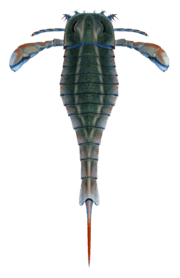Pagea
| Pagea | |
|---|---|
 | |
| Carapace of Pagea symondsii. | |
| Scientific classification | |
| Kingdom: | Animalia |
| Phylum: | Arthropoda |
| Subphylum: | Chelicerata |
| Order: | †Eurypterida |
| Superfamily: | †Stylonuroidea |
| Family: | †Stylonuridae |
| Genus: | †Pagea Waterston, 1962 |
| Type species | |
| Pagea sturrocki (Waterston, 1962) | |
| Other species | |
| |
Pagea is a genus of prehistoric eurypterid classified as part of the Stylonuridae family. It contains three species, all from the Devonian; P. plotnicki from Nunavut, Canada and P. sturrocki and P. symondsii from the Old Red Sandstone of the United Kingdom.[1] The genus is named in honor of David Page, an early worker on the fauna of the Old Red Sandstone and describer of the first Stylonurine eurypterid.[2]
Description
Pagea was a large stylonurid eurypterid. The third and fourth prosomal appendages bore double rows of flat spines. The prosoma was subrectangularly shaped, with the eyes located on the anterior half.[2]
The metastoma was narrow in relation to the width of the prosoma, being half as wide as it was long. The telson was styliform, long and keeled.[2]
References
- ↑ Dunlop, J. A., Penney, D. & Jekel, D. 2015. A summary list of fossil spiders and their relatives. In World Spider Catalog. Natural History Museum Bern, online at http://wsc.nmbe.ch, version 16.0 http://www.wsc.nmbe.ch/resources/fossils/Fossils16.0.pdf (PDF).
- 1 2 3 "Pagea sturrocki gen. et sp. nov., a new eurypterid from the Old Red Sandstone of Scotland | The Palaeontological Association". www.palass.org. Retrieved 2017-12-27.
See also
